The unconventional attitudes on love & marriage of the unmarried 47-year-old actress Faye Yu have taken Chinese social media by storm. In a society where women are facing real pressures to get married, many welcome Yu’s refreshing perspectives.
With contributions from Miranda Barnes.
Chinese actress Yu Feihong (俞飞鸿, born 1971), also known as Faye Yu, has recently become a big topic of discussion on Chinese social media for her refreshing perspective on marriage and singlehood.
The 47-year-old unmarried celebrity was previously on various Chinese talk shows hosted by older (male) presenters, who questioned the actress about her single status. These shows include ‘Behind the Headlines‘ (锵锵三人行) and and ‘Thirteen Invitations’ (十三邀), hosted by Xu Zhiyuan (许知远).

Faye Yu
Yu became a social media hit when popular writer Shen Jiake (@沈嘉柯), on June 20, posted images and quotes of her on the talkshow ‘Behind the Headlines,’ which was hosted by two men Dou Wentao and guest Feng Tang.
The various quotes show how Yu, in a relaxed and matter-of-fact way, addresses questions about her being unmarried, expressing that she does not need a partner to fulfill her needs, and that she did not feel she wants or needs to adapt her life to existing social expectations on the right age to get married.
Within a time frame of three days, the post has been reposted on Weibo over 120,000 times, receiving more than 100,000 likes. Other posts dedicated to Yu’s appearance on the shows have also attracted hundreds of comments and reposts.
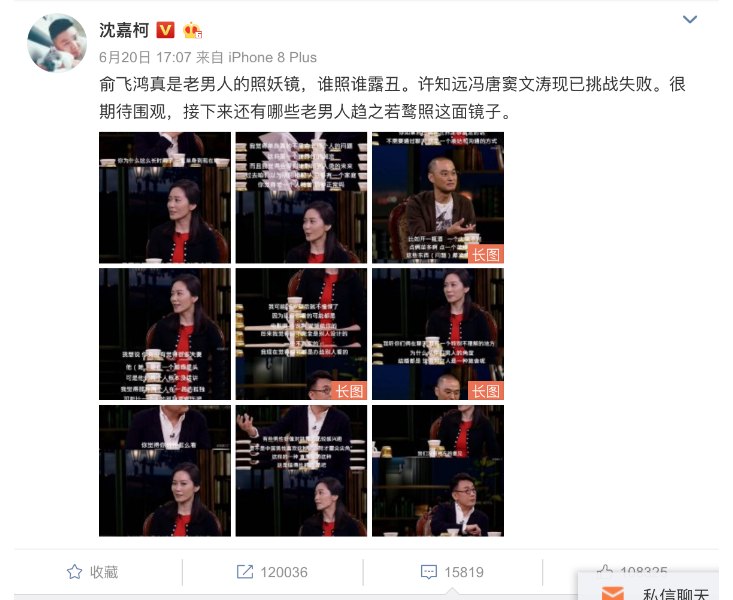
Faye Yu became a social media hit after Shen Jiake posted these images of her appearance in a talk show.
Some of these screenshots include the following:
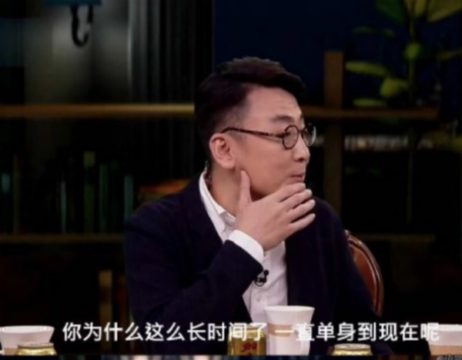
Presenter Dou Wentao: “Why have you already been single for so long?”
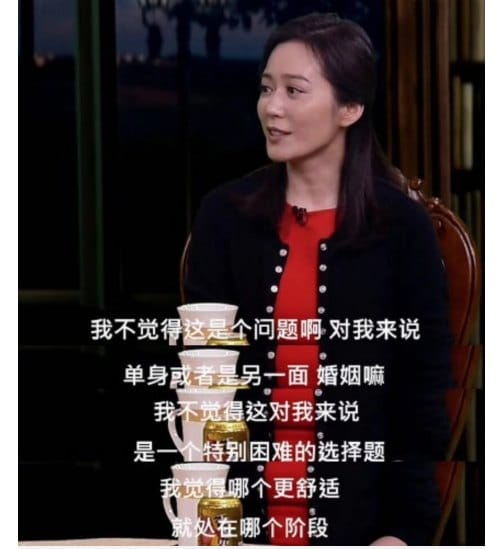
Faye answers: “I don’t think it’s a problem. For me whether to be single or married is not a difficult choice. Whatever stage I find more comfortable, is the stage I’ll choose to be in.“
Author Shen Jiake says about Yu: “Yu Feihong (俞飞鸿) really mirrors [these] old men’s own demons*, making a fool of their own reflections. Xu Zhiyuan, Feng Tang, and Dou Wentao all have to face their defeat.”
“I am rooting for Yu Feihong, she expresses my feelings!”
Over the past few days, thousands of people on Weibo comment on Yu’s attitude and previous interviews. Many of them are young and female.
In recent years, much has been written and discussed on the pressures Chinese women are facing today when it comes to marriage, and their risk of being stigmatized as a ‘spinsters’, ‘leftover women‘ or ‘shengnu‘ when they are older than 25 and still single.
In 2016, an SK-II skincare ad campaign titled ‘She Finally Goes to the Marriage Corner’ became a huge trending topic on Chinese social media. The ad video focused on Chinese single women, pressured to get married by their families and society, who pluck up the courage to speak out towards their parents against the burdens they face.

The SK-II video about China’s ‘leftover women’ that became a hit in 2016.
The online hype around Faye Yu shows similarities with the SK-II topic, and reveals that for many women in China today the pressure to get married is very real.
Chinese media outlets have also started to report on the Faye Yu hype, headlining: “Why are young people suddenly such fans of the 47-year-old Yu Feihong?” The trend is especially noteworthy because the talkshow appearances that have gone viral were recorded a time ago; ‘Behind the Headlines’ is a show that has already been canceled since 2017.
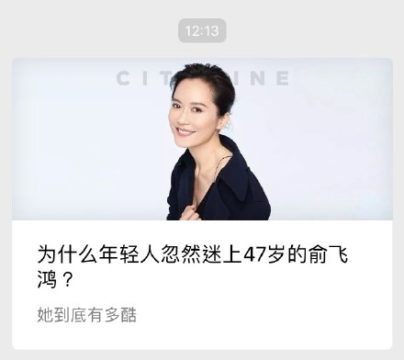
“Why have young people suddenly become such fans of Yu Feihong?”
“There is no age one should get married, there’s just an age one feels they should get married” (“没有该结婚的年龄,只有该结婚的感情), Weibo blogger Yan Wangye (@颜王爷) writes.
“I am rooting for Yu Feihong, she expresses my feelings!”, a typical comment says. “She’s just cool. Beautiful and cool,” others say.
But there are also many men responding to the topic. Famous designer ‘Teacher Kevin’ (@Kevin凯文老师) says: “I really appreciate Yu Feihong’s attitude on marriage: marriage is not a woman’s necessity. To be married or to be single is a personal choice, completely depending on what makes you more comfortable.”
“I have my own concept of marriage.”
Yu Feihong has been in the Chinese showbusiness since she was a child and has starred in dozens of movies since. Outside of China, she is mostly known for her role in the Joy Luck Club (1993). Many of these movies are about romance, and her own love life has been a topic of interest for Chinese journalists for years, especially because Yu is known as China’s “most beautiful woman above the age of 40.”
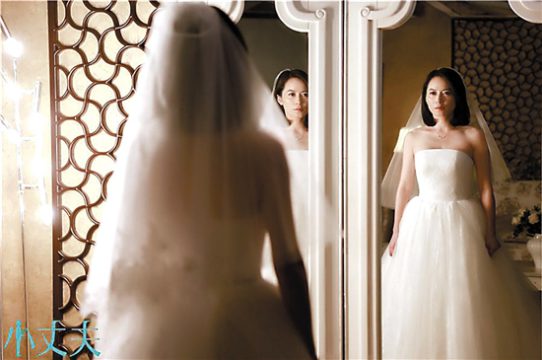
Faye Yu has worn a wedding dress in many of her movies, but not in real life.
In a 2016 interview with Phoenix News, Yu says: “By the time I was 20 years old, I was instilled with the concept of marriage by society and my family. But up to the present day, I will not simply accept a concept given to me by others. I have my own concept of marriage.”
In the interview, she says she has a stable partner, but does not feel the roles of “wife” or “mother” suit her lifestyle: “I don’t reject it, but I don’t feel it is something I need to attain in this life.”
“She says it so well,” one Weibo commenter writes: “I am a proponent of singlehood, although I do not oppose to marriage. I just feel we shouldn’t enter marriage within such a restricted time frame. This is a state of mind that is not welcomed or accepted by the majority of people.”
“I am not married for the mere reason that I do not want to be married yet,” another person says. “It is just so fascinating to see someone with such an independent way of thinking,” others say.
Besides praising Yu’s courage, there are also many who condemn Chinese men such as the talk show hosts Dou Wentao or Feng Tang who do not hesitate to question unmarried women such as Yu about their single status – even suggesting that being single and “being lonely” are practically the same thing.
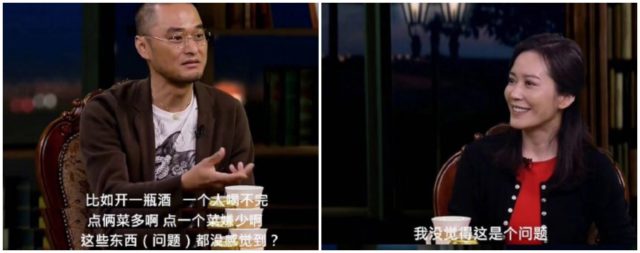
Feng Tang about being single: “But you won’t finish a bottle of wine alone, and if you order food, two dishes might be too much but one dish is never enough. Aren’t you bothered by these kinda things?” Faye responds: “I really don’t have any problems with that.”
Many call these male presenters’ questioning a sign of ‘male chauvinism’ or, literally: ‘straight man’s cancer’ (直男癌). “I applaud Faye Yu’s patience to deal with these kinds of boring questions,” some say.

Faye Yu: “Listening to you guys talking, there’s one thing I don’t get – why, from a man’s point of view, is marrying something you seem to do out of some sort of charity for women?”
“I just really like Yu’s view on life,” another netizen writes: “Whether you’re single or married, the most important thing is to be your own independent person.”
Want to read more? Check out “The Shengnu Dilemma: (Don’t) Marry Before You’re 30.”
By Manya Koetse
Contributions from Miranda Barnes
* The term he literally used is ‘照妖镜’ (“老男人的照妖镜”), which means a “magic mirror for revealing goblins.”
Spotted a mistake or want to add something? Please let us know in comments below or email us.
©2018 Whatsonweibo. All rights reserved. Do not reproduce our content without permission – you can contact us at info@whatsonweibo.com.
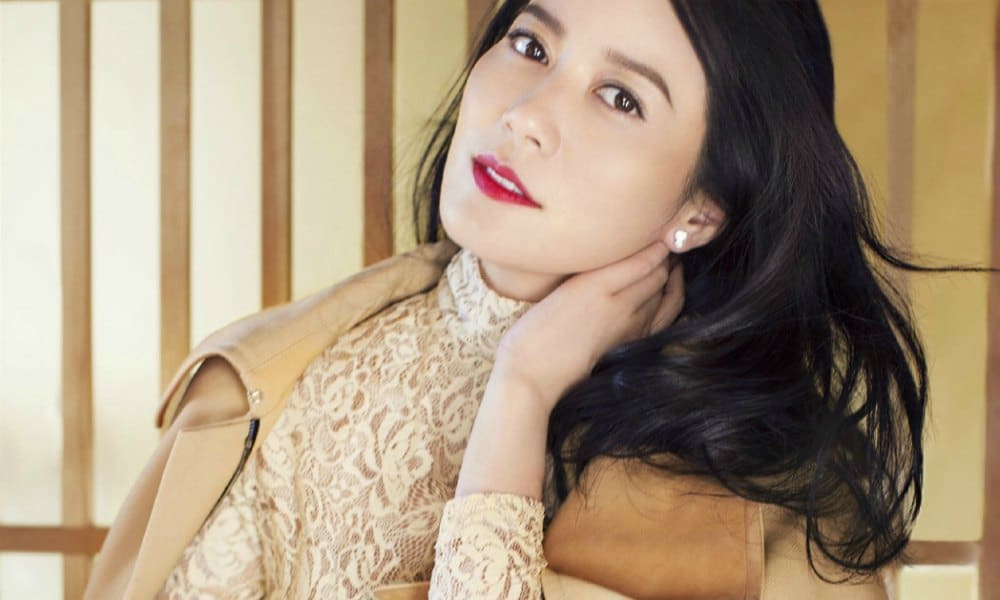

 China Insight3 months ago
China Insight3 months ago
 China Music4 months ago
China Music4 months ago
 China Digital10 months ago
China Digital10 months ago
 China Arts & Entertainment12 months ago
China Arts & Entertainment12 months ago









































LGBTspreadAIDS
June 24, 2018 at 7:38 am
she is probably LGBT and drinks from the furry cup.
Xavier
August 4, 2018 at 2:40 am
@LGBTspreadAIDS
How in the world does not wanting to get married have anything to do with LGBT? I frankly don’t care about getting married and I’m totally straight. So what’s your point?